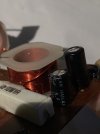I'm replacing the foam surrounds of the woofers in a vintage pair of speakers - Sound Dynamics 300ti. While I'm at it I thought I'd replace the crossover capacitors:


Do I need to pay attention to the orientation / polarization (not sure of the correct term) when I install the new ones? Should I be extra careful about overheating the capacitors when soldering?
FYI - these speakers are obviously not great, or maybe even good. Their job is to be the warm-up act for something much better. More (questions) about that later!
Thanks in advance for your help.
Do I need to pay attention to the orientation / polarization (not sure of the correct term) when I install the new ones? Should I be extra careful about overheating the capacitors when soldering?
FYI - these speakers are obviously not great, or maybe even good. Their job is to be the warm-up act for something much better. More (questions) about that later!
Thanks in advance for your help.

